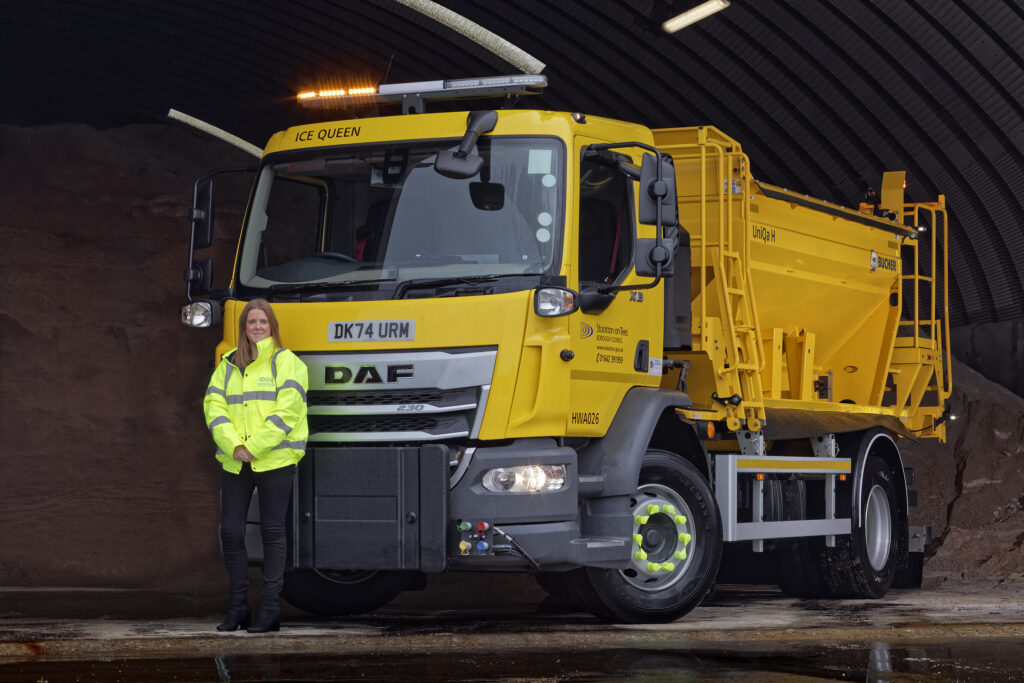NRG Riverside expands into the winter maintenance sector by supplying eight new Bucher UniQa spreaders to Stockon-on-Tees Borough Council on a five-year contract hire basis. Ann-Marie Knegt reports.
Delivered on 1 October under the five-year contract hire agreement, the Bucher UniQa spreaders will help the council deliver a safe winter maintenance service and manage risk. Thanks to the Bucher Assist system, the council can provide historical spread rate information to any claims relating to the service by providing evidence of how and where the spreading has taken place.
The council used to procure their own spreaders; however, the contract hire model is more flexible, according to Councillor Clare Besford, Cabinet Member for Environment and Transport at Stockton-on-Tees Council. ‘The council used to manage the risk internally, however in 2017, the council worked up a business case that included options to either buy a new fleet or transfer some of the risk to a third party via a contract-hire arrangement. We went out to tender six years ago and ended up with a manufacturer-based contract hire solution, which worked out very well,’ says Clare.
Another benefit of the contract-hire agreement was reduced pressure on the space and resources at the council’s maintenance depot. ‘We ran the spreaders from 1 October until 30 April. The season can start earlier or end later, depending on weather conditions. Taking into account possible extensions, the winter maintenance season can last approximately 30 weeks.’
Clare explains that by adopting the contract hire model with maintenance, the contract hire company service and inspect the vehicles on site at Stockton during the season, and in the summer, the vehicles are returned to the contract hire company for summer servicing. This allows the authority staff to focus on their core fleet and free up space during the summer.
The council employs maintenance staff to complete scheduled maintenance and defect clearance on its core fleet. During the winter season, work can be more challenging because of weather conditions, site access, reduced daylight hours, and higher demand for unscheduled repairs. Carrying out scheduled maintenance and repairs on its own winter maintenance fleet was an additional pressure the council wished to manage in a different way.
‘Driver retention is critical,’ she explains. ‘We must ensure that staff can get the snowploughs on the truck and that shifts are shorter and not interrupted by vehicles breaking down. Our staff retention is considerably better than it was due to switching to good quality contract hire vehicles. Every time we have to train a driver, it has a significant cost and time impact.
‘The more efficient the service is, the more attractive it is to drivers, which assists recruitment and retention. Last year, we even had a waiting list, partly because we have created a better working environment with better vehicles.’
She adds: ‘Following a full tender process our decision was to choose NRG Riverside and Bucher Municipal as our successful partner. Our team has worked very hard to get the right product, and Bucher and NRG have listened to our requirements and delivered what we need.’
Long-standing relationship
Winter maintenance used to be perceived as a low-priority service for local authorities, and councils would run spreaders for anywhere between 10 and 20 years. However, this changed when the Beast from the East hit the UK in 2010, which had a major impact on Britain’s infrastructure.
‘That storm changed the council’s appetite for risk,’ says Clare. ‘The government issued a report after the event, and we realised we could never deliver successfully with the fleet we had at the time.’
Stockton-on-Tees Council first entered a contract hire agreement with NRG Riverside for refuse collection vehicles in 2007, and this has developed into a long-standing and trusted partnership. After the last contract hire for winter maintenance equipment ended, the fleet team issued a tender for new spreaders, which was won by NRG Riverside following a full tender process. The new five-year contract hire agreement will see the council operate the spreaders for 26 weeks, with potential extensions, minimising risk and managing the cost of storing and maintaining the vehicles.
‘We have a strong partnership with Russell Markstein and his team at NRG, but the contract was awarded solely on the basis of the quality of the bid,’ says Clare. ‘It is a bonus for us that we already have a long-standing relationship. We know how well we can work with NRG and that this helped embed the current solution we now have in place.’
That solution enables the council to focus on its core operations – ensuring the bins get emptied. This allows the team to offset risk and share experience, skills, and resources with NRG Riverside and Bucher.
‘Councils simply don’t have the space or the resources for the summer overhaul,’ says Russell Markstein, Chief Commercial Officer for NRG Riverside. ‘We specifically opened our new depot in Leeds in July to act as a spreader centre, and we can park over 100 trucks at the facility. The site itself has a high-tech maintenance facility. If the bodies are damaged, we can remove them from the chassis and repair them, and when the season starts again, we deliver them back to the council, fully calibrated and serviced.’
UniQa spreaders
Local authorities in the UK must treat a certain number of roads during adverse winter conditions to keep the road network open and functioning safely, so high-quality equipment for effective spreading is essential. The 18-tonne and 12-tonne Bucher Municipal UniQa 6m3 spreaders come with a Polyx snow plough on a DAF Euro VI chassis and the Bucher Assist control system, which ensures that the correct quantities of salt are used.
Bucher Municipal’s Product Manager – Winter, Andrew Manson, explains that the spreader works differently from other products. ‘It uses a metal belt delivery system to distribute the salt with an added roller breaker. Combined with the Bucher Assist control system, local authorities aren’t throwing away an increasingly expensive resource – their salt stocks.’
This is also useful to combat the increasing rise of litigation that local authorities are dealing with. ‘We occasionally have to provide factual data from the machines as supporting evidence when something goes wrong or even in a court case,’ says Councillor Clare Besford. ‘A calibration certificate will form part of the council’s defence to claims. We need to prove in court that we are getting the right amount of salt on the roads at the right time.’
Andrew Manson from Bucher adds that there is an increased awareness of the environmental impact of salt on highway verges and the decline in biodiversity it causes. This means that how the spreader delivers the salt to the road is critical.
The Polyx snowploughs on the UniQa spreaders enable Stockton to clear the road back to the surface, removing most of the ice and allowing less salt behind the spreader. ‘The focus in the UK tends to be mainly on the spreaders,’ says Andrew. ‘However, there should be an equal emphasis on the snow plough, because used effectively these can significantly reduce salt use.’
The time of day that spreading takes place is also critical, as Clare Besford explains. ‘There is less traffic to crush and distribute the salt at night, so you usually have to use more. During busier conditions, other vehicles on the road aid in reducing the salt down to manage the risk of ice.’
To simplify the process, UniQa’s Bucher Assist system not only helps drivers effectively treat roads but also navigates them around the route. The spreader automatically delivers the salt at the correct application rate and spread width for any given location. The system, as supplied, can be fully integrated with weather data and road sensor data providers, increasing the level of automation on offer. This provides the operator and decision-makers with transparency in salt usage at a granular level, while also recording potential evidence as to which roads have been treated and in what quantities of salt instead of delivering salt in a 20-gram blanket application level for the entire route.
‘Bucher Assist reduces decision-making for drivers who already have to deal with adverse conditions in snow and ice, other road users, and difficult driving situations,’ says Bucher’s Andrew Manson. ‘The technology enables them to focus on their core job.’
The UniQa consists of a carbon-steel body that has undergone a five-stage paint process to achieve the best strength-for-weight ratio. The hopper floor is made from stainless steel because salt will be conveyed over it, which will cause abrasion over time.
Andrew explains that while the salt might take a layer of paint off, it won’t penetrate the steel. ‘The metal belt delivery system works at a slow speed and higher torque, so it can move larger quantities of salt towards the end of the hopper, where the roller breaker system is placed. The roller breaker rotates against the flow of salt coming towards it, causing any large particles to break down into a uniform size. At the end of this conveyor belt, the salt naturally drops down onto the chute.
‘However, due to the secondary function of the roller breaker, salt is also thrown down the chute, minimising the wave effect commonly seen with alternative salt delivery systems, significantly improving the spread pattern at the end of this conveyor belt. This causes a waterfall effect, where salt falls into the chutes.
‘The wider belt design with roller breaker also helps prevent bridging and tunnelling, enabling consistent spreading through an engineered design that challenges the conventional approach and combats the problems faced by drivers whilst delivering UK de-icing salt. This system improves the spread pattern and prevents bridging and tunnelling. It is a relatively simple system, but it is where this spreader’s strength lies.’
Russell Markstein adds: ‘In terms of engineering, this is a leap forward. The machine’s build is very heavy-duty. Everything about this vehicle caught my eye.’







